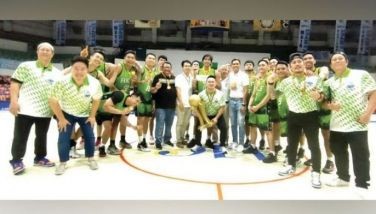Victory hounded by misgivings
My mentor Juanito Jabat used to remind me about a certain rule of thumb in journalism, especially when elections are just around the corner. "Columnists do not apply, they are invited," Mr. Jabat would say. It was by this unseen axe that many aspiring columnists failed to make it into our pages. The grizzled old veteran with whom I continue to have the honor of working always had a way of showing applicants the door without their ever knowing what hit them.
This is neither about Mr. Jabat nor about columnists. I just brought this up because certain developments in this country have created a situation in which I am reminded of Mr. Jabat's admonition. And I am referring to Noynoy Aquino's appointment of Solicitor General Francis Jardeleza as the newest associate justice of the Supreme Court.
I am sure Mr. Jardeleza is very much qualified for the position. And I am not begrudging Noynoy for making an appointment that is his prerogative to make. What appalls me is the clutching manner with which Mr. Jardeleza coveted the position. Maybe I am just a more laid back person than he is. But I cannot imagine myself going all the way to the Supreme Court just to have my name in a list of names from which Noynoy can take his pick.
Unlike Mr. Jabat's measure, aspirants for the Supreme Court may indeed apply. But usually these applications are low key. And I prefer it that way for one reason and one reason only -- I hold the Supreme Court with such high respect that, to me, anyone who openly salivates for membership in such a select circle loses the quiet dignity that I think every member must be cloaked with forever.
Mr. Jardeleza went to the Supreme Court protesting that he was not given due process after his name was not included in the short list of nominees. To me, due process neither outweighs nor supplants the prerogative with which no less than the Constitution has vested in the Judicial and Bar Council to prepare such a list. But even if due process does outweigh or can supplant constitutional prerogative, I feel Jardeleza should have dropped his bid once he got his due back.
Fighting for due process leaves off a different perception when due process means access to a Supreme Court seat. For a Supreme Court seat is different from a place at some presidential table at a banquet, or some high-paying executive position in a multinational corporate giant. The Supreme Court is as much about perception as it is about the law and justice.
The Supreme Court can put a finger precisely on a nettlesome law and install justice where hope has long diminished. But if in so doing its image had been sullied for whatever reason and by whatever means, any ruling that under different circumstances would have been seen as gems of jurisprudence will forever taste of ashes in the mouth.
Mr. Jardeleza may have only been fighting for what was his right to due process. But the perception generated by such a fight was that of a covetous person who has pulled all the stops in lusting after a Supreme Court position. Had it been for a different position, Mr. Jardeleza would have been seen as a resolute, tenacious and feisty individual worthy to be egged on.
But as I said, the fact that a seat in the Supreme Court is the bone of contention makes all the difference in the world. To be seen openly and very publicly fighting for that seat, even to the point of going to court over it, cannot but send only the wrong signals to a disbelieving citizenry. In the end, Mr. Jardeleza may have won a seat in the Supreme Court, but at what a terrible cost.
In fact, Mr. Jardeleza's entry into the Supreme Court could not have come at a most inopportune time. The Supreme Court has just come out of the DAP issue smelling of a thousand roses. By voting unanimously to declare as unconstitutional Noynoy's hijacking of certain items in the budget as illegal savings, the Supreme Court managed regain respect for an image that had been tarnished by flip-flopping and the impeachment of its own chief justice.
Given the spectacle Mr. Jardeleza put up to win his seat, all that had been regained has suddenly been endangered again. The great insistence with which Mr. Jardeleza had himself included in the short list of nominees has made him a marked man now that he is in. And that does not bode well for an institution that is now under attack by Noynoy, the very person who appointed Jardeleza.
Again, the Supreme Court is not your ordinary organization where any means may be employed for acceptance. In the Supreme Court, it is very important to maintain the perception that a person is not seen to be overly covetous for a position. Of course, to make it to the Supreme Court is the dream of every person in the legal profession. But it is one thing to dream, and another to scream in your sleep.
I fear that Mr. Jardeleza's unbridled desire to make it to the Supreme Court will only result in the public's prejudging of many forthcoming court rulings, the most prominent and most anticipated of which is its decision on Noynoy's plea for reconsideration of the DAP ruling. And while that may be unfair, the public cannot certainly be faulted.
After all, what kind of public reaction can really be expected given the manner in which Mr. Jardeleza strove mightily to win his Supreme Court seat. We only reap what we sow. Let us just hope Mr. Jardeleza will disprove what his actions suggested. Let us hope that he will conduct himself contrary to how he has been perceived. The Supreme Court is too vital an institution to lose because of one man.
- Latest

























